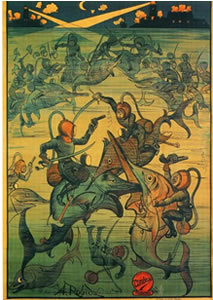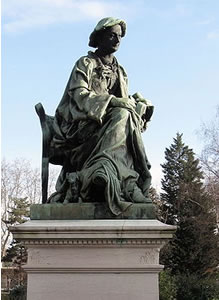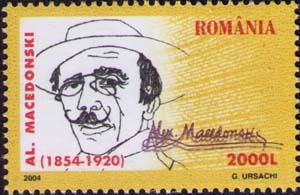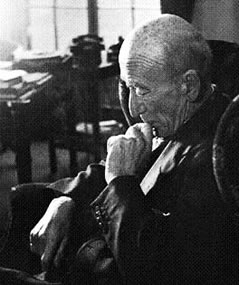De Franse schrijver, tekenaar, schilder, karikaturist en journalist Albert Robida werd geboren op 14 maart 1848 in Compiègne. Zie ook alle tags voor Albert Robida op dit blog.
Uit: The Monkey King (Fragment uit: Voyages très extraordinaires de Saturnin Farandoul,
vertaald door Brian Stableford)
„The entire natural world was their oyster. They appeared to be enjoying the admirable view with a tranquil proprietary right that no anxiety could trouble. There, as if in a magical looking-glass, all the beauties of the tropics were spread out: all the glorious flowers that the equatorial sun could bring into bloom, marvellous plants, giant trees and a thousand-fold weave of lianas.
Four little monkeys of various heights gambolled on the grass, swinging from descending lianas as they went past, and chasing one another around the coconut palms under the protective eye of their father and mother — more serious individuals, who were content to mark their joy at the good weather’s return by quietly shaking their hindquarters with perfect panache.
The mother, a lovely she-monkey with an elegant figure and a graceful demeanour, carried in her arms a fifth offspring, which she suckled as she walked, with a candour and a dignified serenity that would have tempted the chisel of a Praxiteles.
Suddenly, their tranquillity was disturbed. The father, at the sight of an object extended on the beach, turned two or three somersaults — a gesture which, among the monkeys of these distant climes, signifies the most colossal astonishment. The mother — without ceasing to nurse her infant — and the four little monkeys likewise turned half a dozen simultaneous somersaults before coming to rest on all fours, unnerved. If they were alarmed it was that the object perceived by the monkey was stirring and struggling, desperately twirling its arms and legs, as a crab does when one plays the practical joke of setting it down on its back.“

Albert Robida (14 maart 1848 – 11 oktober 1926)
Illustratie bij Les Aventures extraordinaires de Saturnin Farandoul
De Franse dichter Theodore Faullain de Banville werd geboren op 14 maart 1823 in Moulins in de Auvergne. Zie ook alle tags voor Theodore de Banville op dit blog.
La Lyre
Les Dieux, pour lui laisser le vin, buvaient du fiel.
L’aigle à ses pieds veillait, ayant quitté son aire ;
Le lion devant lui se couchait, débonnaire,
L’abeille était joyeuse et lui donnait son miel.
Il avait sur son front le signe essentiel,
Et du rouge vêtu, comme un tortionnaire,
Dans sa droite féroce il portait le tonnerre,
Étant celui qui fait la clarté dans le ciel.
Pourtant, sans être ému de sa terrible approche,
Moi, je chantais mon ode et j’emplissais la roche,
La caverne et le bois de cris mélodieux.
Enfin je m’avançai, pris du sacré délire,
Vers celui qui soumet les tigres et les Dieux,
Et je lui dis : Amour, obéis ; j’ai la Lyre !

Theodore de Banville (14 maart 1823 – 15 maart 1891)
Standbeeld in Moulins
De Roemeense dichter Alexandru Macedonski werd geboren op 14 maart 1854 in Craiova. Zie ook alle tags voor Alexandru Macedonski op dit blog.
Le Cloître
II
Silence : la prière. Et — silence : la lune…
Par couples, sourds, les sons parcourent les entours,
Et la lune a bleui la toiture des tours,
Et des frémissements ont pétri la nuit brune.
L’église brusque l’ombre ainsi qu’un blanc fantôme,
O mon cœur, je t’avais cru mort, et pour jamais.
Mais me revoici pur, et tel que je m’aimais,
Hors de Gomorrhe, avec sur mes lèvres un psaume.
III
Or, voici que les eaux glauques se font de lait ;
La mare est un lac clair, les cieux scintillent mauves,
Des lucioles, gais éclairs emmi les sauves
Gemment l’air et, grisant, fleure le serpolet.
Et puis, tandis que les roseaux en ce décor
Élèvent leurs voix d’or vers la bonté mystique,
Il s’en dégage comme un très subtil cantique,
Vagues soupirs, douceur de flûte, éclat de cor.

Alexandru Macedonski (14 maart 1854 – 24 november 1920)
De Engelse schrijver Algernon Blackwood werd geboren op 14 maart 1869 in Shooter’s Hill, Kent. Zie ook alle tags voor Algernon Blackwood op dit blog.
Uit: Max Hensig
„Besides the departmental men on the New YorkVulture, there were about twenty reporters for general duty, and Williams had worked his way up till he stood easily among the first half- dozen; for, in addition to being accurate and painstaking, he was able to bring to his reports of common things that touch of imagination and humour which just lifted them out of the rut of mere faithful recording. Moreover, the city editor (anglice news editor) appreciated his powers, and always tried to give him assignments that did himself and the paper credit, and he was justified now in expecting to be relieved of the hack jobs that were usually allotted to new men.
He was therefore puzzled and a little disappointed one morning as he saw his inferiors summoned one after another to the news desk to receive the best assignments of the day, and when at length his turn came, and the city editor asked him to cover “the Hensig story”, he gave a little start of vexation that almost betrayed him into asking what the devil “the Hensig story” was. For it is the duty of every morning newspaper man—in New York at least—to have made himself familiar with all the news of the day before he shows himself at the office, and though Williams had already done this, he could not recall either the name or the story.
“You can run to a hundred or a hundred and fifty, Mr. Williams. Cover the trial thoroughly, and get good interviews with Hensig and the lawyers. There’ll be no night assignment for you till the case is over.”
Williams was going to ask if there were any private “tips” from the District Attorney’s office, but the editor was already speaking with Weekes, who wrote the daily “weather story”, and he went back slowly to his desk, angry and disappointed, to read up the Hensig case and lay his plans for the day accordingly. At any rate, he reflected, it looked like “a soft job”, and as there was to be no second assignment for him that night, he would get off by eight o’clock, and be able to dine and sleep for once like a civilised man. And that was something.“

Algernon Blackwood (14 maart 1869 – 10 december 1951)
Zie voor onderstaande schrijver ook mijn blog van 14 maart 2009.
De Zwitserse schrijver Paul Ilg werd geboren op 14 maart 1875 in Salenstein (Thurgau).
